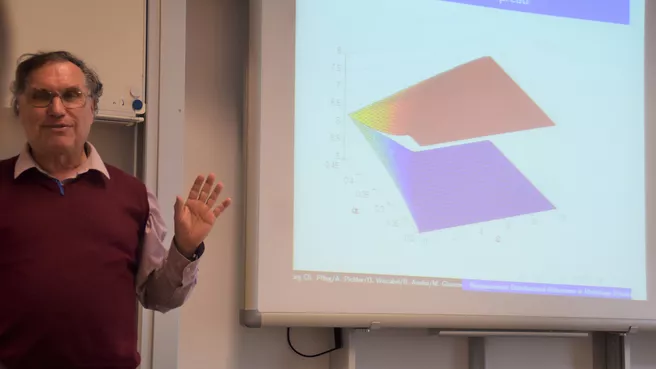Many decision models in finance, energy, insurance, business etc. contain models of uncertainty. In some cases, these models are found ad hoc, in other cases they are based on same statistical analysis of available data. However it is often ignored that the estimates come always together with some estimation and/or model error. The incomplete information about the correct statistical model is called "model ambiguity".
We review some recent results about how (nonparametric) model errors can be incorporated into the decision process. To this end, we introduce the ambiguity set as the set of models compatible with our observations and extend the basic minimzation problem to a minimax (saddle point) problem. For multistage problems, the ambiguity relates to some sets of distributions for stochastic processes, which we characterize. The minimax solution is called "distributional robust".
In this talk we demonstrate examples from various fields, such as portfolio optimization (ambiguity of the whole model or only of the compula), pricing of contingent claims, multistage hydro reservoir management, valuation of a thermal power plant and last but not least designing optimal insurance contracts.
In all these cases, the correct price or value obtained by solving the minimax problem (or its dual) contains an additional component, which we call the ambiguity premium. This premium comes in addition to the well known risk premium. The better the statistical model is identified, the lower is this premium.
Alexandre Forel (TUM): Production planning under seasonal and uncertain demand: an application in the agrochemical industry
In the agrochemical industry, tactical production planning is done using uncertain sales forecasts as demand can depend on unpredictable parameters such as meteorological conditions during the next growing season. In order to deal with uncertainty in the forecasts, it is common in practice to implement a production plan in a rolling-horizon fashion. However, frequent updates of demand forecasts may lead to high nervousness: important variations in the quantities planned at successive production plans.
Because of the impact of demand forecast evolution on the planning quality, we model the forecast evolution using the Martingale Model of Forecast Evolution (MMFE) and integrate it in a cost-minimising dynamic programming problem. The customer satisfaction and the capacity limits are included using chance-constraints on the service level and feasibility respectively. The optimal production policy for a single product is determined analytically and performance improvements are assessed in a numerical study compared to a myopic model that ignores forecast evolution.
Venue: TUM Campus City Room Z536
Date: Monday, May 27th, 2019, 14:00
